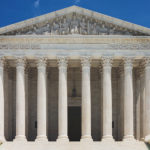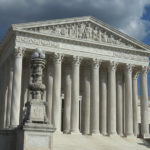WASHINGTON—The U.S. Supreme Court ruled unanimously that people whose rights under the Religious Freedom Restoration Act have been violated can seek the same legal remedies—including monetary damages against individuals—as anyone protected under other civil rights laws.
In an 8-0 decision on Dec. 10, the court ruled in favor of three Muslims who said they were placed on the government’s no-fly list because they refused to become FBI informants.
Newly appointed Justice Amy Coney Barrett did not participate in the case, which was argued before she joined the Supreme Court.
The case, Tanzin v. Tanvir, concerned Muslim men who were seeking damages from federal officers who allegedly tried to coerce them into violating their deeply held religious beliefs by spying on fellow Muslims.
While the men eventually were removed from the no-fly list, one of them—Muhammad Tanvir—said he had to quit his job as a long-haul truck driver because he could not fly home after making long one-way deliveries. He also asserted he was unable to visit his ailing mother in Pakistan for an extended period.
The Trump administration had urged the court to dismiss the lawsuit, asserting it would interfere with matters of national security and law enforcement.
‘No constitutional reasons’ to shield federal officers
Writing on behalf of the court, Justice Clarence Thomas emphasized the Religious Freedom Restoration Act of 1993 provides people whose religious liberty rights have been violated the right to seek damages against government employees.
“A damages remedy is not just ‘appropriate’ relief as viewed through the lens of suits against government employees. It is also the only form of relief that can remedy some RFRA violations,” Thomas wrote.
He acknowledged “there may be policy reasons why Congress may wish to shield government employees from personal liability, and Congress is free to do so. But there are no constitutional reasons why we must do so in its stead.”
Sign up for our weekly edition and get all our headlines in your inbox on Thursdays

Holly Hollman, general counsel of the Baptist Joint Committee for Religious Liberty, called the decision “a rare—and welcome—unanimous opinion from the Supreme Court, upholding religious freedom rights.”
“BJC joined the Christian Legal Society and 14 religious liberty scholars in advocating for just such a result,” Hollman added, referring to a friend-of-the-court brief filed in October. “With this decision, the Supreme Court makes it clear that RFRA allows for damages under the same principles that are followed in other federal laws that, like RFRA, protect important civil rights.”
BJC led a broad coalition that crafted RFRA and worked to assure its passage in Congress in 1993. RFRA was created to ensure the government does not substantially burden the free exercise of religion without a compelling interest to do so.












We seek to connect God’s story and God’s people around the world. To learn more about God’s story, click here.
Send comments and feedback to Eric Black, our editor. For comments to be published, please specify “letter to the editor.” Maximum length for publication is 300 words.